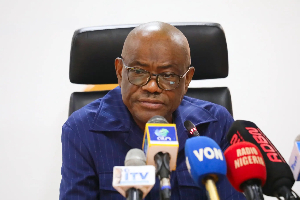Nobody can gainsay the fact that education is the bedrock of national development, globally. Any nation-state that is keen on and desirous of achieving sustainable economic growth and technological advancement should place much premium on issues bedeviling its educational system. The superpower countries, which have military might, economic wealth, and technological culture, have great educational institutions. And their schools are bastions of scientific knowledge and studies in the arts and humanities. Regarding countries with great schools, America readily comes to my mind. Doesn’t it have Harvard University, Massachusetts Institute of Technology, and others? And, in England, there is the Oxford University.
Now, some Asian countries have evolved their own technological culture with help and inputs from their universities. And their scholars have formulated variants of democracy that suit their respective countries’ cultural peculiarities. National development is dependent on functional educational system. Not surprisingly, Nigeria brings up the rear on the ladder of global national development chiefly because of its dysfunctional educational system. It is an irrefutable fact that there is a correlation between the growth of a country and the effectiveness of its educational system.
Until the mid-1980s, universities in Nigeria used to be the educational Mecca for foreign students, who sought quality education. However, the rot in our educational system as well as the dip in the quality of education obtainable in our schools came in the wake of the military adventurism by General Ibrahim Babangida. We still remember how the military dictator deported Dr. Patrick Wilmot, a lecturer at the Ahmadu Bello University, Kaduna to his home country. Other progressive – minded intellectuals and lecturers were hounded out of the country, too. The brain drain that ensued in Nigeria, then, became the brain gain of many European countries, Canada, and America. Now, from Asia to Antarctica, and from Europe to America, many topnotch doctors, lawyers, lecturers, scientists, and astronauts, who are contributing meaningfully to the development of their host countries, hail from Nigeria.
Back home in Nigeria, our academics and scientists in the citadels of learning do dish out recycled 30-year-old lecture notes to their students, not to talk of their pushing back the frontiers of knowledge in their areas of specialization. But the lecturers’ lack of creativity and lukewarm attitude to their jobs are caused by the government’s utter and criminal neglect of the educational sector, which has become both normative and phenomenal.
Luckily, and, thankfully, too, some corporate organisations have instituted prizes to honour and reward secondary school teachers, who are outstanding in their core duties of moulding the personalities of students and imparting knowledge and skills to them. Gone are the days when people would always say that teachers’ rewards are in heaven. But we are not unconscious of the stark fact that giving teachers prizes is an incentive and recognition that will boost their morale and spur them to give their best.
And, it should be noted that since 2015, the Nigerian Breweries Plc, the organisation that instituted the Maltina Teacher of the Year Prize, has been honouring and rewarding teachers yearly for their splendid performances in the field of teaching.
In the maiden edition of the Nigerian Breweries Plc Maltina Teacher of the Year competition, a self–effacing petite Chemistry teacher from Federal Government Girls’ College Nkwelle – Ezunaka, who is called Rose Nkem Obi, won the national teaching diadem. Mrs. Obi attributed her victory to a blend of her faith in God and sedulous disposition. She said that her winning the teaching diadem has boosted her enthusiasm for teaching and gave her a huge voice to offer suggestions to government at different levels on how to revamp our comatose educational system.
Her winning the award gave her an opportunity to undergo an educational programme at the University of Manchester, United Kingdom, where she was taught effective methodologies of teaching. Lately, I visited her at Federal Government Girls’ College, Nkwelle-Ezunaka, and she offered her suggestions on how we can tackle our educational problems: “Our school curricula should be expanded to include skill acquisition programmes/courses into them, and what is not necessary should be removed from the curricula.’’ I concur with her on this as students who are equipped with practical skills can deploy them in doing jobs from which they can eke out their existence.
Again, regarding the welfare of post-primary school teachers in Nigeria, the Federal Government has formulated some educational policies that are designed to better the lot of teachers. But, it seems that only teachers in the Federal Government Secondary Schools will benefit from that welfare package for teachers. Against the background of state governments going cap in hand to solicit money from the centre, can they implement the Federal Government’s newly approved welfare package for teachers?
Again, Mrs. Rose Obi, an award-winning teacher and percipient analyst, gave her take on the thorny issue: “What is happening in most of the states is mismanagement of funds. If funds are managed properly, the states won’t have problems in paying civil servants their entitlements and salaries. The money used to run political offices is too much; much of it should be channeled into executing educational initiatives.’’
In Nigeria, education is on the concurrent list, which imposes the responsibilities of handling educational matters on both the state and federal governments. But the sad, pitiable, and execrable condition of most secondary schools owned by states in Nigeria is a true portraiture of state governments’ utter and criminal neglect of education. And, alongside teachers in federal government -owned schools, teachers in state-owned secondary schools are poorly remunerated. They receive mere pittance at the end of every month.
The political leaders at the state level should know that education is very critical and pivotal to the development of Nigeria. Education should take its pride of place in Nigeria as only skilful and knowledgeable people can drive our national developmental initiatives. No nation-state desirous of achieving sustainable economic growth and prosperity, technological advancement, and stable political polity neglects the issues troubling its educational system.
Opinions of Sunday, 18 April 2021
Columnist: Chiedu Okoye















